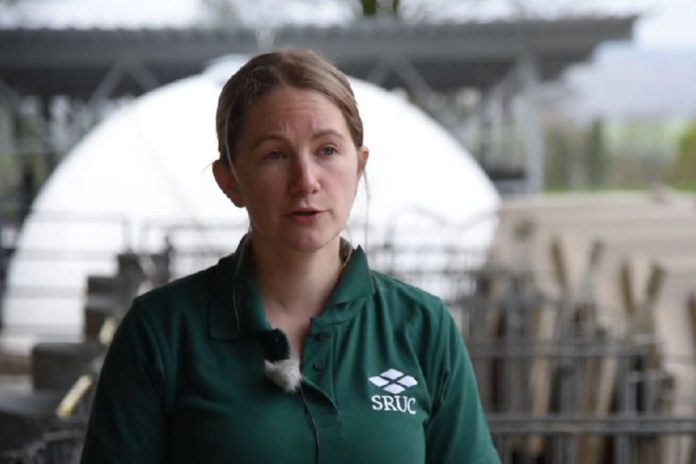According to Katrina Henderson, veterinary investigation officer of SRUC Veterinary Services, Crypto is a parasite that is a common cause of calf diarrhoea in calves from 1-4-weeks-old.
She explained that the main clinical sign associated with Cryptosporidiosis is diarrhoea.
In a video that Scotland’s Farm Advisory Service released, she outlined that these calves could go on to become dehydrated.
“They will have sunken eyes, will sometimes be lethargic, and some may look like they have abdominal pain also.”
“Dehydration can lead to the death of a calf also. How severely calves will be impacted and how severely calves are likely to be impacted depends on the calf’s health status.”
Crypto in calves
She explained that calves, kept at the right temperature, and are well-fed with a well, functioning gut, with no other diseases, are more likely to fight off Crypto.
Also, being in this health state is likely to have a less severe impact on growth rates.
She advises farmers to hand a faecal sample in to their local veterinary office or a local laboratory to diagnose calves. “They will do a smear and stain it to look for the oocysts,” she explained.
“In terms of treatment, fluid therapy is really the most important part of it,” she added.
She explained treatment aims to keep calves alive, healthy, and growing.
“Fluid therapy might be oral fluids if the diarrhoea is quite mild and calves are bright and well in themselves.”
“However, if diarrhoea is severe, and they sunken eyes and are quite dull, then contact your vet for intravenous therapy,” Henderson added.
Colostrum management
Lorna MacPherson, dairy specialist, stressed that colostrum management and hygiene in calf sheds are “crucial” when preventing Cryptosporidium in calves and disease spread.
“When it comes to colostrum management, we must remember the 3 Qs: quality, quantity and quickly.”
In recent days, we covered an article on testing colostrum quality to check antibody contents.
We also featured an article on the ‘colostrum 123’ rule, which you can read.
MacPherson stressed that it is important to get colostrum into calves “as soon as possible after birth because the absorption of immunoglobulins after birth declines over time”.
“A calf should always be well-fed to maintain their energy intake, especially in cold weather. Any nutritional stresses or an energy deficiency can make them more susceptible to infection, but also increase the severity of symptoms with Crypto.”
“Always feed healthy calves first and sick calves last to minimise the disease spread,” she advises.
Disinfectants and calf jackets
She added that only certain disinfectants are licenced for use against Crypto.
Furthermore, she highlighted that many commonly used farm disinfectants might not be effective. Her advice is always to follow the manufacturer’s guidance on product usage.
Farmers should ensure they have a disinfectant footbath outside the calf shed for workers to use on entry and exit.
“If using calf jackets, make sure to wash them at a high temperature (ideally above 60 degrees Celsius) between use.”
“Only temperatures above 60 degrees Celsius will kill Cryptosporidium eggs. The disinfection of calf pens is also a critical step in the prevention of this disease.”
She said this applies to individual calf pens, hutches, and group pens. When it comes to group housing of calves, she believes it is best possible to have a batch all-in, all-out system.”
“Disinfectants will work best after steam cleaning to get rid of any dirt. When it comes to grouping calves, try to keep older calves separate from young calves because older calves may still be infected even if they are not showing any clinical signs.”
She advises that when it comes to grouping calves, try to ensure that there are no more than fourteen days spread between calves within a group.
Also, isolate any sick animal as soon as possible. “They should remain isolated for at least one week after scouring has stopped.”
“These calves can still shed Cryptosporidia eggs for a few days after they have appeared to recover,” she concluded.
Note: Always seek advice from your vet.





